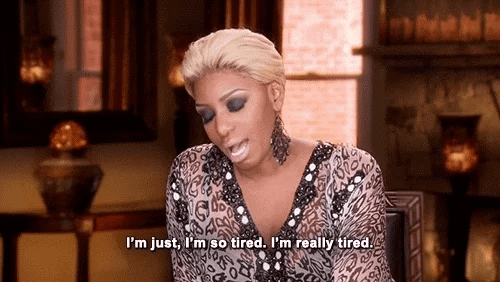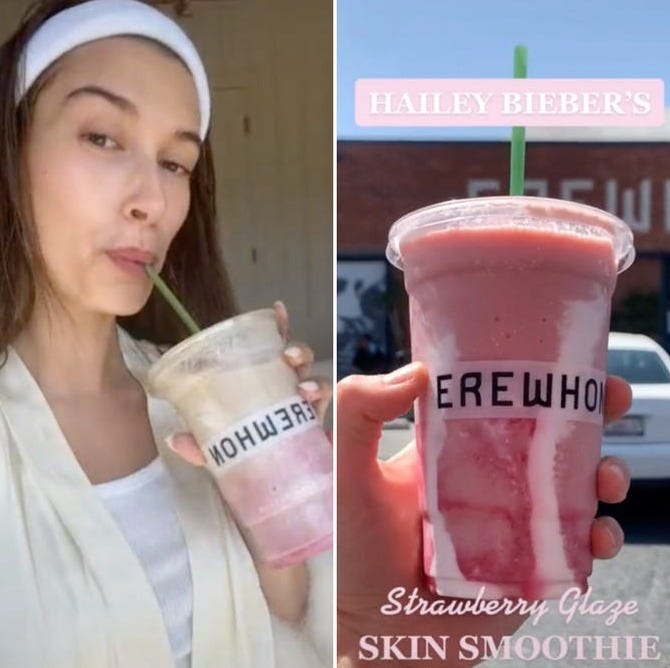Is wellness meant for everyone?
Wellness reminds me of those elite nightclubs where you have to wait on long lines for entry. Then once you are let inside, you realize it is all smoke and mirrors and more of a status symbol.
“So, do you believe in the concept of wellness?” This was a question that I was asked recently by a podcast host. For clarification, I have been embarking on the nonstop book launch promotion train for a few weeks now. And can I just say, as an introvert, constantly having to talk about the book has been the hardest part after actually writing. Don’t get me wrong, though; I love it, and I spent a very long time writing the book, so of course, I love to discuss the topics. However, I think my fellow introverts will understand that social battery sometimes runs low. Anyway, during one of the interviews, I was asked about my views on wellness because it is a whole chapter in my book. (Shameless plug here.)
I write about how similar diet and wellness cultures are; in fact, I call them cousins in the same family tree. So, it is not a far-fetched question to wonder if wellness has a place in our lives. During this particular interview for the podcast, the two hosts played various social media videos of influencers making some pretty heinous and downright dangerous claims. You can probably use your imagination to figure out the content in question. Everything from the promotion of raw milk consumption (dangerous) to my favorite (sarcasm) motto being played, “We all have the same 24 hours in the day. Some people just have poor time management.” (Heinous) Lucky for me, the hosts were on the same page as far as the content as I was, but one of the hosts asked me if I believed in wellness and if there was an actual place for it.
For the record, I want to say that wellness does, in fact, exist, and there is a place for it. Let’s first look at what wellness is defined as. The Global Wellness Institute defines wellness as “an individual pursuit—we have self-responsibility for our own choices, behaviors, and lifestyles—but it is also significantly influenced by the physical, social, and cultural environments in which we live.” One thing I do notice is that wellness is used interchangeably with health, and neither of these two is the same. Health actually refers to a static state of being, and wellness is the pursuit that can lead toward an outcome of optimal health. According to the World Health Organization (WHO), health is a state of complete physical, mental, and social well-being and not merely the absence of disease or infirmity. Let me point out that each individual’s health is unique and, therefore, different. We can aspire to physical health, meaning increasing activity to maintain and/or strengthen our bones, muscles, and joints. We can aspire to improve our mental health by working on our stress levels. For our social well-being, we can try to balance our social and personal lives. These measures fall under the scope of health, and health serves as a currency in society, but not for the reasons one might think.
Health is often associated with morality, and we uphold individuals who seem as though they are doing everything in their power to be as healthy as possible. So many people feel the need to prove their health status. That may look like constantly posting a gym selfie or the healthy foods they’re eating daily. We congratulate such individuals on making health a priority even though we don’t know if they’re exercising unsafely or excessively. We don’t know about the exact foods someone is eating or if they are eating enough or practicing disordered habits. But we don’t seem to care about those details because we see a thin body or someone who is actively working toward a thin body. Thanks to diet culture, we say that we uphold and care about health, but we are really upholding beauty standards. The only reason we care about what someone is or isn’t doing is because of what they look like.
Okay, so what does this have to do with wellness? Since we tend to uphold health to a moral, and more times than not, a superficial standard, we tend to have an elitist view of wellness. This is why so many folks will gladly pay $19 for the “Haley Beiber Smoothie” sold at Erewhon. Ingredients are listed as Malk Organic Almond Milk, Organic Banana, Organic Strawberries, Organic Avocado, Organic Dates, Organic Maple Syrup, Vital Proteins Vanilla Collagen, Vanilla Stevia, Sea Moss, Organic Coconut Cream, and Driscoll's Organic Strawberry Glaze. (As a side note, reading through these ingredients made me laugh because how many times have you seen the health influencers say that you should only consume foods with five or less ingredients? I don’t know why five is the magic number, but we are looking at eleven in this smoothie. I digress.)
Well, let me just say that $19 for a smoothie even made me do a double take, and I live in New York City. I’m sure that it tastes delicious, and I even heard it tastes like a strawberry milkshake, however, if this were not associated with Haley Beiber and her glowing skin, would it sell as hard? Again, this is attributed to us associating good health with someone’s physicality only, and we view it as “hard work.” We don’t take into account genetics or unlimited access to resources. Seeing people drink these smoothies all over social media is due to a need to appear to have a level of status. Even if the word status is never actually said or used, it is implied. This is what wellness is now, it’s a status symbol rather than an actual pursuit that one can do. I am not saying not to drink or purchase smoothies, nor am I saying that this smoothie is “unhealthy.” What I am trying to emphasize is the unspoken elitist mindset that is now associated with the word wellness.
One of my favorite quotes from my book (yes, another shameless plug) is, “Wellness culture always makes me think of the exclusive nightclubs in New York City or Miami. The ones where you see lines out the door to get in and all of these seemingly beautiful people waiting to enter. You have no idea what’s inside, but you want to feel amazing and beautiful also, so you stand in line as well to get in because you want to feel special. And that’s all any of this is, a feeling of being special and included.” I am far past my nightclub days, but I do remember the feeling that I described above. I will never forget being at a friend’s bachelorette party in Miami years ago, and we were, yes, waiting in line to get into one of the nightclubs. We waited in line for what felt like an eternity (standing in heels will give you that feeling), and there was this sense of relief when the bouncer finally gave us the go-ahead. When we walked in, the place was empty. And I say this with no exaggeration: it was dead. We were in line to get into what was a seemingly exclusive place, which, as it turned out, was all smoke and mirrors.
“When you are unique, you get more attention, and this attention can be reinforcing,” says Regan A. R. Gurung Ph.D. I came across this quote for another article I was writing on consumerism, and I think that there are some similarities here. With both wellness and consumerism, we are rewarded for our apparent status or our attempt to gain access. This is the main reason why we live in an individualistic society and why so many align with a healthism attitude, because we are told to work hard and we will be rewarded for our efforts. So yes, that $19 smoothie is seen as working hard for and prioritizing health. Same thing with spending money on retreats in Costa Rica, a $40 yoga class, or even a $40,000 Longevity membership at Equinox. Yes, you read that correctly: $40k. If someone wants to do any of these things, I am not knocking them down. I will definitely be shocked at spending $40k on a gym membership, but hey, if someone wants to, why not? However, these products and lifestyle expenses should NOT be the defining factor when it comes to wellness.
Wellness, to me, can be taking a walk after work in order to achieve the goal of mental clarity and exercise. It does not have to involve spending tons of money in order to achieve elite status, but even that walk has to take factors into consideration, such as green spaces and safety. Wellness can mean making smoothies with some frozen strawberries that were on sale at your grocery store and a protein powder from Costco. Again, it does not mean spending the most in order to achieve a certain status. Health is individual, and it will look different on everyone, and because of this, wellness will be individual and look different to everyone.
This is the question that I always ask everyone to really think about: Are certain food(s) and products really superior for your health, or are they just appealing because they’re expensive and not easily accessible for everyone? Remember that wellness attracts the elite, and it can be so easy to fall into the idea of wanting to be a part of this exclusive club. When it comes to wellness, the fact that it is not readily available to the masses seems to heighten its appeal. After all, why would you want something everyone can afford? If anyone can afford a protein powder, is it really considered exclusive? Could the product still be considered superior? Most likely not.
If you like what you just read, this is a reminder that I wrote a whole book on this topic and more. Live Nourished is out today and available wherever books are sold. Get yours today!








“For the record, I want to say that wellness does, in fact, exist, and there is a place for it.”
I appreciate this so much as someone who has a business with the word wellness in it. It’s become a red flag. I often fear that the people I follow and admire dismiss me almost immediately because they think I'm a huckster out there trying to make a buck. The truth is I'm an old lady who has lived through the worst of diet/wellness culture. I'm tired of seeing real opportunity and possibility stunt women because society wants to shrink them away. It does my heart good to see you and others pick up on this and speak out. Those voices are getting louder and it’s so necessary! I work with older women with a focus that we have to work to wade through the BS out there. We talk to discover what they really want; how to define their own “well," move beyond appearances and learn to respect what the body does for them. It’s not an easy fix. I don’t get many clients. And I never got into those exclusive clubs.
I was just thinking the same thing, after reading this article: https://torontolife.com/deep-dives/the-cult-of-wellness-othership-nutbar/
Exactly it, it’s a nightclub where only the richest and most genetically blessed (ie already skinny and beautiful) may enter. Except when you enter, it’s a cult. Blows my mind.
Also what struck me about people who partake in or actually actively perpetuate this “wellness” lifestyle after reading this is that they are utterly devoid of humour. I don’t think I could stand to take myself that seriously, even if it meant I had no anxiety (which is also just delulu).